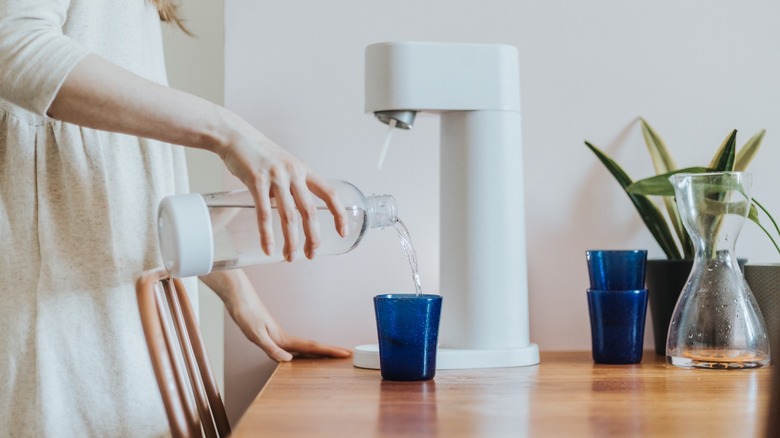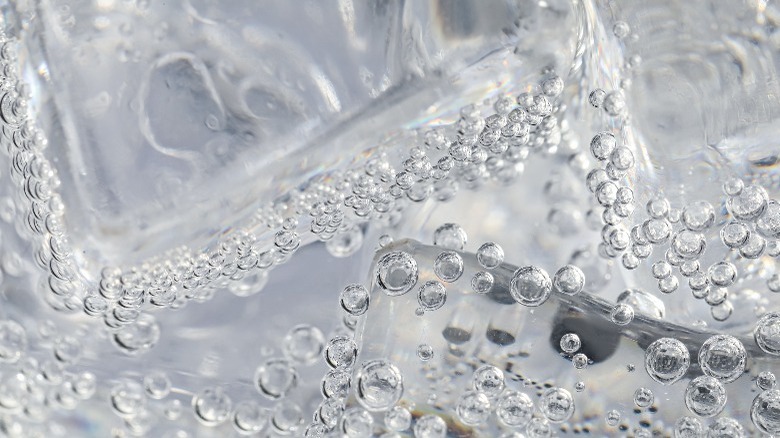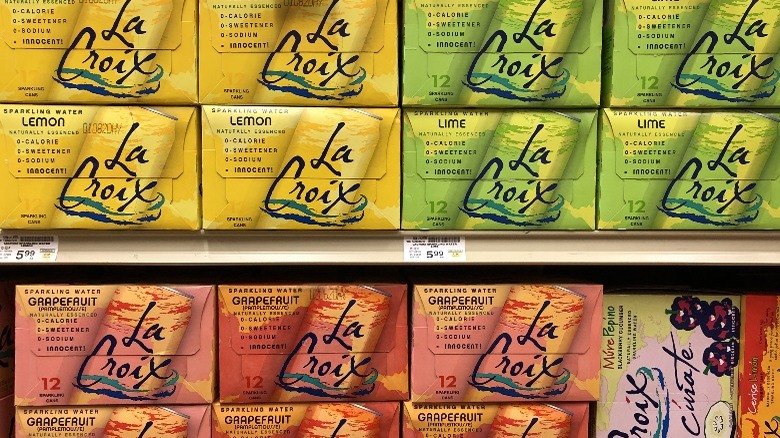Trick Yourself Into Better Hydration By Reaching For Seltzer
Drinking water to stay hydrated is important, but for many, it's also really boring. For those who get tired of water's mild taste, it may be a good move to switch to seltzer to add some variety to your drinking habits. Carbonated water has the same hydrating properties as regular still water, but the bubbles make drinking a glass seem closer to enjoying a soda, which can be a more effective motivator for upping fluid intake.
Seltzer is just another word for carbonated or sparkling water, created by introducing carbon dioxide to still water under pressure. The result not only forms the signature bubbles that are the main appeal of drinking seltzer, but also carbonic acid, lending the beverage a slightly acidic flavor. You can use a home soda maker machine to replicate this process, or if you want to go old-school, use a soda siphon bottle with a CO2 cartridge. These are those retro glass bottles with the spray handles that you may see laying around bars and restaurants, but there are modern versions of this device available, too. It's also worth mentioning that the carbonation of mineral water occurs under natural conditions in springs, while club soda has artificially added minerals. Both of these taste less acidic than standard carbonated seltzer water due to the additives.
The pros and cons of carbonated hydration
A 2016 study published in the American Journal of Clinical Nutrition measured the hydration levels of liquids in comparison to a tap water control group and found that sparkling water was just as hydrating. What's even more heartening to know for carbonated water drinkers is that the electrolytes found in mineral water will actually make hydration even more effective. If seltzer water is what you need to start drinking water regularly throughout the day, then it's perfectly fine to consider it as a daily substitute. It's especially helpful for those who are looking to kick a soda-drinking habit.
However, carbonated water has some minor downsides, so you shouldn't replace all water with its bubbly counterpart. The higher acidity can possibly start to damage tooth enamel over time, although BBC Future notes there isn't a ton of solid evidence to back up any claims of serious decay. It's just probably best to temporarily avoid drinking seltzer if you have recently had any dental work done or, as dietician Vicki Shanta Retelny suggested to EatingWell, drink it though a straw. Claims of carbonation damaging bone are even less supported, and Harvard Medical School noted those that experienced lower bone density in a 2005 study were probably just drinking less milk and thus ingesting less calcium. The gas in carbonated water can also cause short-term bloating, so avoid drinking it right after a workout.
What about flavored seltzer?
Flavored carbonated water — sold by brands like LaCroix, Bubly, and Spindrift — is a popular choice right now for those looking to add even more spice to their hydration habits. These are also generally safe to drink regularly, although there has been some controversy with their additional ingredients. In one incident, there was a 2018 lawsuit against LaCroix alleging that the company's use of the term "natural flavorings" was misleading to consumers since its additives appeared as synthetic chemicals in products like cleaning fluids and insecticides. However, said chemicals are allegedly found naturally in concentrated fruit essences, Insider reported.
The main component to watch out for when consuming flavored seltzer water is sugar or any other sweeteners. Most of the major brands state that there's either 0% sugar or no additional sugar besides the negligent fruit flavorings, but it's still worth taking a glance at the label to make sure you're not just replacing soda with soda-lite. Still, any form of carbonated water is healthier for you than soft drinks, and bubbles may be an effective way of curbing soda cravings.



